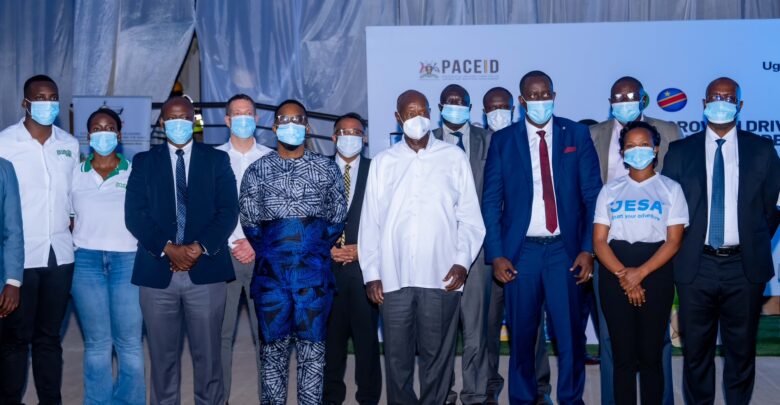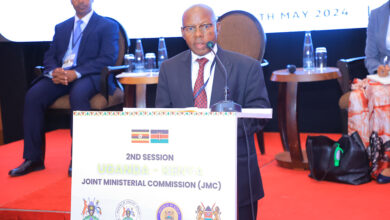BusinessHealthLocal News
Museveni launches African Continental Free Trade Area implementation strategy for Uganda
Museveni launches African Continental Free Trade Area implementation strategy for Uganda

President Museveni has commissioned the Free Zones Export Facility at Entebbe International Airport and also launched the African Continental Free Trade Area implementation strategy for Uganda that aims at promoting and fostering trade within African countries and internationally.
The event that ran under the theme, “Uganda’s next level growth driven by Regional Export Opportunity and AfCFTA”, was attended by private sector players, investors and representatives from the United Nations as well as trade representatives of Uganda in different countries.
Museveni who flagged off the first formal exports of products to West Africa, raised his concern about the delays by some actors in government to implement these important programs that are critical for the economic growth of the country and the African continent.
“I am pleased to kick off the journey for the first formal exports of products to West Africa under AfCFTA which Uganda and 44 other countries signed in 2018. Even with negotiations on the matter of the rules of origin, tax rates, non-tariff barriers, it shouldn’t take this long seven years to activate this work. It should have been done much earlier because I’m aware that more than 45% of all our value-added goods and services are traded within the region and the African continent,” he said.
“The lack of essence of urgency and the failure by some of our actors in the ministries to act quickly on important issues of our economic growth hinders the rate of our growth and affects the performance of the private sector. But now that we have started I don’t want any further delays.”
The president lauded his counterpart, Bola Ahmed Tinubu of Nigeria whom he interacted with a week earlier on the matter of the market along with his government, for allowing Uganda to work together with the Nigerian government on opening Nigerian air space for flights into each other’s territories and making room for Ugandan products under AfCFTA.
“I am told we have a trade representative based in Lagos to support the opening of this market and I will give him all the necessary support needed for the process to be fully concluded with both the Federal Republic of Nigeria government and the AfCFTA Secretary General in Accra,” he said.
Museveni reminded the audience of the cardinal principle of the NRM of Pan-Africanism that facilitates trade and the building of wealth together within African countries.
“As I have told you in the past, NRM strongly believes in the principle of Pan Africanism not as an altruistic matter but as a utility principle. When we trade with each other in Africa, we build wealth together and create a strategic centre for the future of African socio-economic transformation and security,” he noted.
He described the day as one of the key fulfillment of Pan-Africanism that the NRM has been talking about and the utilization of a major tool of trade to quicken social and economic change not only in Uganda but also on the African continent.
“When Africans wake up as some of them are doing in Uganda, you find that the internal market is not enough so without the African market we cannot succeed. I think this is the problem with Latin America. Latin American countries have a lot of natural resources, but you wonder why they don’t succeed while the United States, their neighbor, which has less natural resources than South America, is very prosperous. That is why they are walking on foot to go from South America to the United States. I think the difference is in trading together,” he observed.
He disclosed that plans are underway to open up similar facilities in the four corners of the country to make it faster for exporters to aggregate, process and get to the market more easily.
“I remember I received a delegation of fresh fruits and vegetables people from Europe and our young man who is the trade envoy in the Balkans for Uganda in October 2023. I directed that on account of the work for Uganda in the export sector, they should be given this facility for 5 years along with some 5 acres of land near the airport. This is to make their investment and export work logistics cheaper,” he said.
“This export facility we are commissioning today for coffee roasting, packaging and export along with fruits, vegetables and flowers is the first step to many facilities we plan to open in at least the four corners of the country to make it faster for exporters to aggregate, process and get to the markets more easily.”
He also recollected that the Serbian trade envoy had equipment for roasting and storing coffee and wanted to assemble the
machine in Uganda to make coffee drinking in the country and region easier and create jobs for the youths. He therefore wondered why some actors were delaying this important project.
“I don’t want to hear any further delays. I am directing the PACEID committee and the Minister of trade Hon. Mwebesa to quickly establish why there are delays and report to me after the coming holidays,” he directed.
He however pointed out that when people come to Uganda to seek opportunities they do so for Ugandans and for the employment of their children.
“As you can see, they will even activate some of the markets we have sat on that we have not been able to take advantage of for so long. I don’t want to hear any further delays of export support and investment our people bring and it is deliberately ignored because of lack of cooperation or even fought by some elements,” he said.
On the other hand, President Museveni was glad to see that the first exports to the Nigerian market under AfCFTA from Uganda include dairy, coffee, fish, pharmaceuticals and tea, noting that it will help to add other support to the larger commodities that are now produced in Uganda and find market for crops like tea that have suffered lately.”I didn’t know that there is more Uganda can do including tourism and attracting investments from the Nigerian business Community. I want this to open up,” he declared.
“Tell me what you need as export supporting institutions and we will work this out with you,” he further assured the investors.
President Museveni additionally tasked the investors going to run the facility in Entebbe to ensure that the centre is a place of exemplary performance, certification assembly roasting and will serve both the AfCFTA market and the Balkans region.
He thanked the Balkans trade envoy for working with Ugandan officials to reopen an old trade agreement signed with the former Yugoslavia in 1963 by the late Mayanja Nkangi for fish, fruits and coffee.
Museveni also asked investors to take interest in locations where the government has injected a lot of money for irrigation projects such as Doho in Butaleja, Mobuku in Kasese, Ngenge and Atar in Kween district whose occupants are planting low value crops.
“This is unacceptable for projects where we have spent more than shs50 billion in such one of these locations. I need high value crops there and I am told that both Ngenge in Kween and Mobuku can produce high value chili peppers, French beans, snow peas, sugar snaps, eggplants, okra and onions that are all in very high demand in Europe in winter and the Middle East.”
He said eggplants alone can fetch between $7 to $9 a kilogram in Southern Europe and the Middle East.The president further said the same products are also consumed in the Central and West African markets especially in large cities of Kinshasa and Lagos.
“I’m therefore asking you to organize with my exports advisory team and my political assistants who know those locations well as well as agriculture and water people to meet the households in these locations, train them and offer seeds and buy in bulk from them and export these products from here. I will support these efforts.” President Museveni said.He expressed gratitude to all stakeholders for working hard to improve Uganda market standing.
“Uganda will give you a high return if you focus on sourcing good raw material that we have in plenty. It is the same with minerals, tourism, hospitality and the manufacturing for consumer goods. We are ready to cooperate with you,” President Museveni assured the investors.
The Minister of Trade, Industry and Cooperatives,Francis Mwebesa shared the history of free zones, stating that the concept dates back to centuries originating as duty free ports where merchants could trade goods without a burden of taxes and tariffs.
“Historically, ancient trading hubs such as Venice and Singapore played a similar role of fostering commerce and prosperity by eliminating trade barriers in the modern era,” he said.




